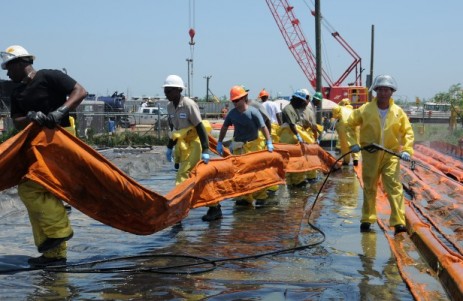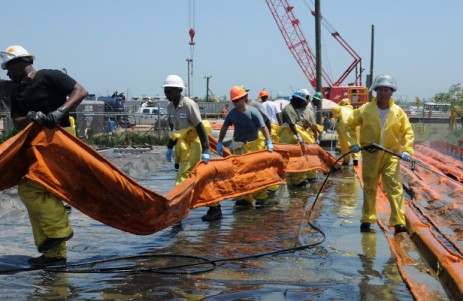 Cleanup crews are getting the highest exposures to both the oil spill itself and chemical dispersants.Photo: U.S. Coast Guard
Cleanup crews are getting the highest exposures to both the oil spill itself and chemical dispersants.Photo: U.S. Coast Guard
Cross-posted from NRDC’s Simple Steps blog.
Dr. Gina Solomon provides answers to the health questions raised by the Deepwater Horizon offshore oil rig explosion and the efforts being made to contain it.
How do you think the health of local communities around the gulf will be impacted from the oil?
The petroleum vapors and mists can cause a variety of immediate health effects. There are also long-term health concerns because some of the contaminants from the oil will remain for a long time in the sediments and will accumulate in the food chain. Contamination in fish and shellfish—for many years into the future—may pose a significant risk of cancer and other health effects.
What’s actually in oil that could be hazardous to health?
Oil contains a mixture of chemicals. The main ingredients are various hydrocarbons, some of which can cause cancer (such as the PAHs or polycyclic aromatic hydrocarbons); other hydrocarbons can cause skin and airway irritation. There are also certain volatile hydrocarbons called VOCs (volatile organic compounds) which can cause cancer, and neurologic and reproductive harm. Oil also contains traces of heavy metals such as mercury, arsenic and lead.
How can these chemicals get into our bodies?
VOCs and some of the other hydrocarbons can be inhaled, causing lung problems and other health effects. Skin contact causes irritation and rashes. The oil will contaminate fish and shellfish, causing health risks from eating these foods that could persist for years.
What are the acute health effects from exposure to the oil?
Inhalation of oil vapors or aerosolized particles (from wind-blown waves) can cause headaches, dizziness, nausea, vomiting, irritation of the eyes and throat and difficulty breathing. People with asthma or other lung diseases could have serious exacerbations. High-dose inhalation (if people are very close to the vapors) may cause a chemical pneumonia known as “hydrocarbon pneumonia,” which can require hospital care. Direct skin contact can cause various kinds of rashes, including generalized skin irritation, or something known as “folliculitis” from oil-clogged skin pores.
Have you had any reports that the oil is making people sick?
We have been hearing some reports from people along the coast who are noticing the smell of oil. Some people have been complaining of headaches, nausea, coughing and throat irritation. We are collecting reports of health problems.
The Louisiana Department of Health is setting up shelters for those impacted by the air emissions. What do you know about the quality of the air and how it would possibly affect people?
People with underlying respiratory disease—such as emphysema, chronic bronchitis or even moderate or severe asthma—are at especially high risk of exacerbation from the vapors and aerosols. Petroleum is very irritating to the airways. As mentioned previously, at high doses such as might be experienced by workers it can cause hydrocarbon pneumonia.
Are there risks to pregnant women?
Some of the volatile chemicals in oil have been linked to miscarriage, preterm birth, and low birth weight, so it is a good idea for pregnant women to avoid the areas where there are elevated levels of VOCs in the air. These are areas that include noticeable smells of oil or visible oil and also any areas where the EPA monitoring system detects elevated levels. The EPA air monitoring results are being updated regularly at www.epa.gov/bpspill. To be cautious, pregnant women may choose to avoid any areas directly along the waterfront and beachfront, even when oil is not visible.
What about risks to children?
Young children should not be allowed near the beach where they could come into direct contact with the oil. Other than this, recommendations for children are the same as for adults.
What about risks to pets?
Pets should not be allowed on the beach in any areas where they could come into direct contact with the oil.
How does this situation affect the shrimping/fishing industry in terms of the quality of our food?
Apart from the economic disaster to the industry, this spill poses a long-term health concern for the safety of the fish and shellfish. Contaminants in oil can persist for years and accumulate in the food chain, causing elevated cancer risks or neurological risks from exposure to heavy metals such as mercury. It will be important for FDA and others to establish a rigorous monitoring program for the seafood that we eat from the Gulf subsequent to this spill.
Are there any health concerns associated with dispersants?
The dispersant that is primarily being used contains petroleum products, sulfonic acid salts and propylene glycol. It is somewhat volatile and will enter the air. Chemicals in dispersants share some of the same toxic properties as chemicals in the oil itself. Therefore it is critical for clean-up workers and volunteers to wear personal protective equipment at all times when either applying the dispersant or working where it has been applied. By the time the dispersants reach shore, they will probably be highly diluted and won’t pose a threat for communities, but this is something we’ll keep an eye on if they start using dispersants close to populations.
What about the fishermen and volunteers who are working to clean up the oil and rescue wildlife?
These are the people I’m most worried about. They are getting the highest exposures and they need adequate protection, both from the oil spill itself and chemical dispersants that are being applied to break up the oil. BP should provide these workers with proper protective equipment. In the meanwhile, volunteers at the Louisiana Environmental Action Network are providing workers with respirators, impermeable gloves and arm protectors. We’re still dealing with illnesses in the first responders and cleanup workers from the World Trade Center attack in 2001. It is a big mistake to put our first responders and clean up workers at risk again.
If I want to help with the clean-up, what kind of protective equipment do I need?
A half-face vapor cartridge respirator, rubber boots, and butyl rubber gloves are the minimum equipment needed if you will be in the oil-contaminated zone. Skin protection could also include Tyvek arm protectors, or a full Tyvek suit. For proper protection, it is recommended that you be fit-tested for the respirator to make sure it is adequately protecting you. We are looking for information about places where people can go to be fit-tested. A paper respirator mask and thin latex gloves will not protect you from the oil or dispersant fumes.
People are renting out rooms in their homes to the responders. Could this be a risk of possible exposure?
Yes. To limit exposure, people should not wear work shoes or boots into the house, and should have facilities where they can shower and change their clothes before going into homes. If showering and changing is not possible, then all contaminated clothing should be removed before entering the house. Oil-soaked clothing should be discarded in sealed plastic bags. Slightly soiled clothing should be laundered separately from clean clothes.
What about if they’re burning the oil offshore?
Burning will release particulate matter, which is harmful to the lungs. To check on particulate matter levels in your area, visit the EPA AirNow website. If the air is noticeably smoky or if the levels of particulate matter are high on the EPA website, avoid any strenuous activities outdoors. People with heart or lung disease, children or the elderly should consider staying indoors in an air-conditioned room and change the air-conditioner filter to make sure it is maximally effective.
What are your recommendations for how people should protect themselves?
- Avoid areas where oil can be seen or smelled. If you see or smell oil, leave the area right away.
- Avoid any direct skin contact with oil, oil-contaminated water and sediments.
- If any oil makes contact with your skin, wash it off immediately with soap and water.
- Do not fish, swim, or engage in water sports in the oil spill-affected waters.
- Young children, pregnant women, people with compromised immune systems and individuals with underlying respiratory conditions should avoid the areas near the contaminated water.
- If you experience symptoms such as headache, nausea, dizziness or throat irritation, leave the area immediately; if the symptoms do not resolve within a few minutes, seek medical attention.
- Anyone who experiences difficulty breathing, shortness of breath or other serious symptoms should seek immediate medical attention.


